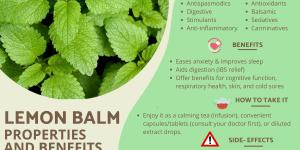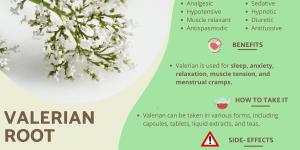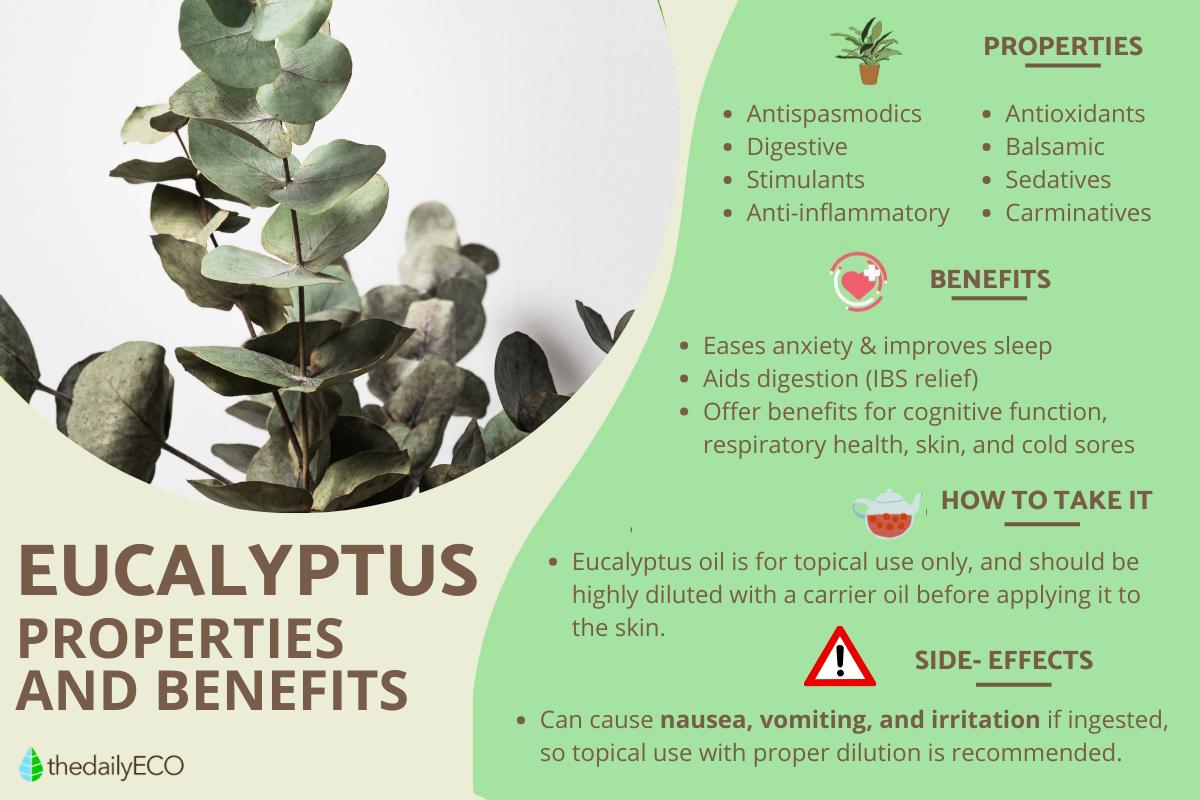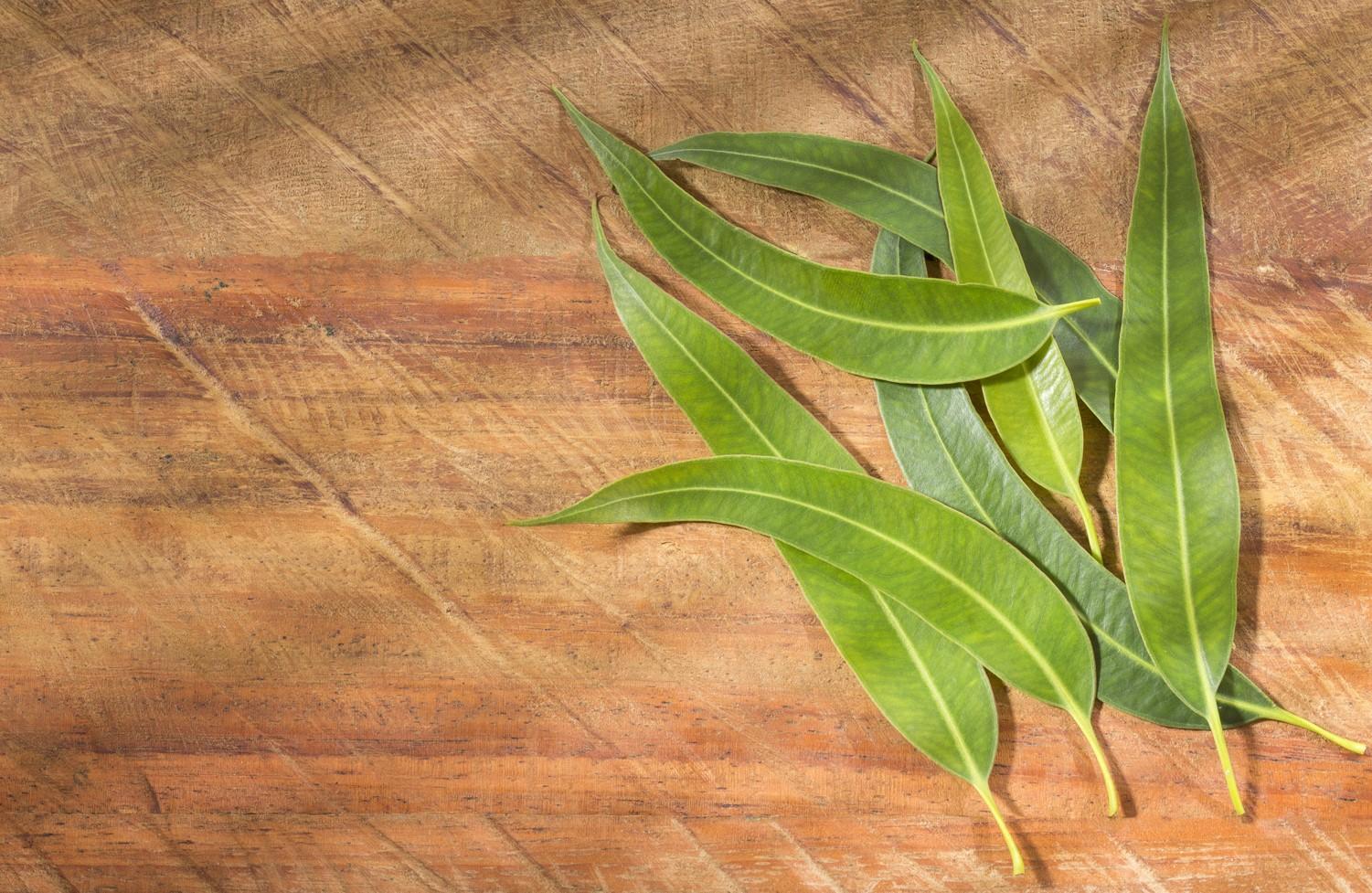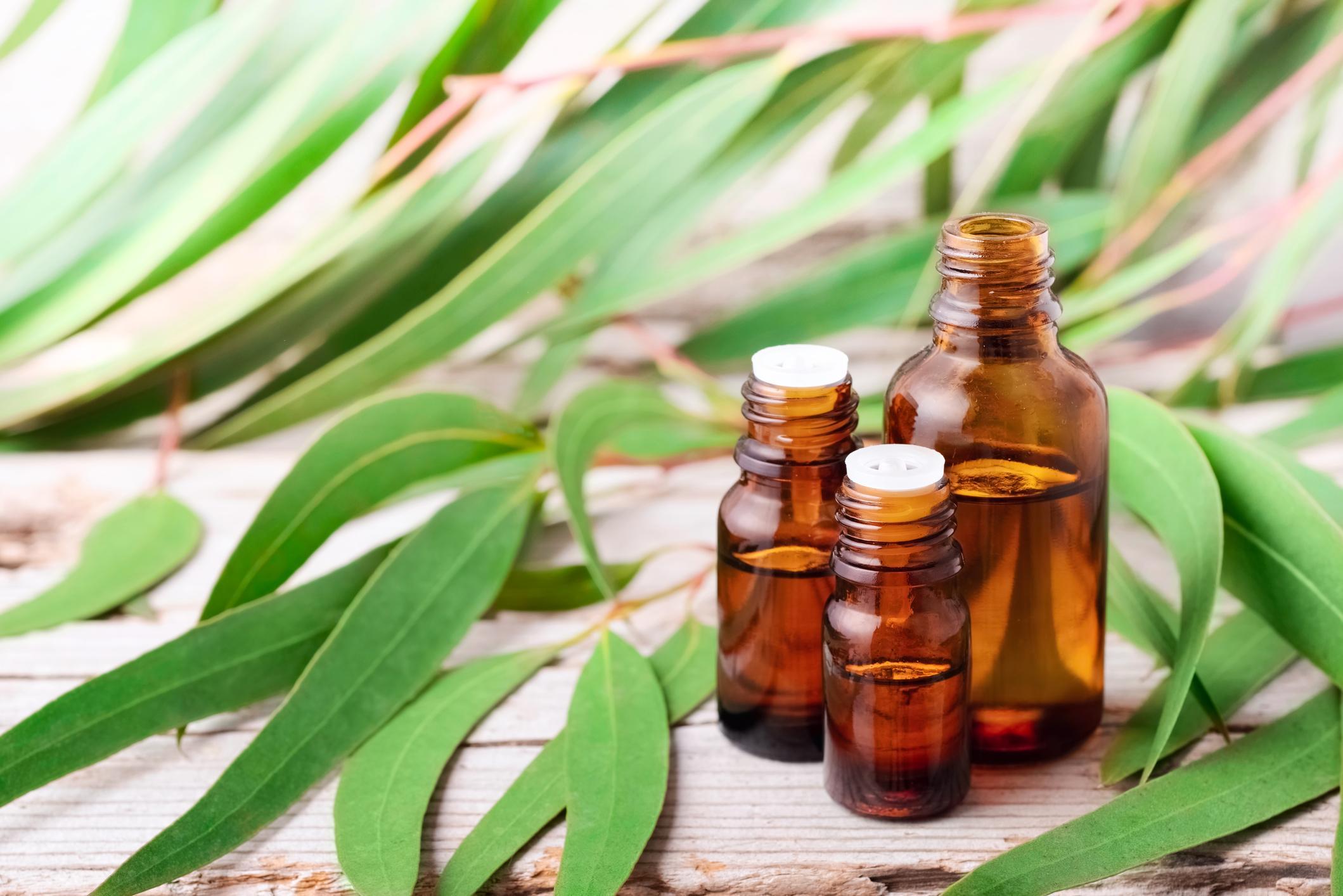Eucalyptus - Properties, Uses and Contraindications


Eucalyptus boasts a range of impressive properties, including antiseptic, anti-inflammatory, healing, and immunostimulant effects. These properties make eucalyptus a valuable natural remedy for treating respiratory ailments, including coughs and colds. While eucalyptus offers a rich history of use dating back to the Australian Aboriginals, and its benefits are now scientifically proven, it's crucial to note safety precautions.
This article by thedailyECO will delve deeper into the properties, uses, and safety considerations of the Eucalyptus tree.
Characteristics of the eucalyptus tree
Eucalyptuses are a diverse group of trees with a wide range of characteristics:
- Eucalyptus trees are some of the fastest-growing trees in the world, with some species reaching heights of over 300 feet (91 meters) in just a few hundred years.
- Its lanceolate leaves are pale green to grayish in color and feature a curved tip, providing a unique appearance.
- The bark of the tree is whitish on the outside and red on the inside, shedding periodically in strips, revealing the inner layer.
- Eucalyptus produces yellow flowers with numerous stamens, resulting in hard, bell-shaped fruits that contain numerous small seeds.
- It is a perennial plant native to Australia, where it thrives in diverse habitats ranging from wet forests to arid regions.
- Eucalyptus is now cultivated globally, primarily for its versatile uses, including timber, pulpwood, essential oils, and medicinal properties.
- When eucalyptus leaves are rubbed, they emit a distinct aroma due to their active ingredients, which include cineole and terpenes, giving the tree its characteristic scent.
You may also be interested in: Benefits of Milk Thistle - Properties, Uses and Contraindications
What is the eucalyptus good for?
Eucalyptus leaves boast a fascinating chemical composition that translates to a range of potential health benefits.
Eucalyptus leaves contain various bioactive compounds, including:
- Flavonoids: these natural antioxidants possess anti-inflammatory and antimicrobial properties.
- Tannins: known for their astringent properties, tannins may contribute to eucalyptus' wound-healing potential.
- Essential oils: the eucalyptus oil we often associate with the plant is rich in compounds like eucalyptol, which offer various health benefits.
Thanks to its chemical makeup, eucalyptus has been linked to several promising health effects:
- Anti-inflammatory
- Antiseptic
- Expectorant
- Antioxidant
- Antiviral and antibacterial
While eucalyptus offers promising benefits, it's crucial to consult a healthcare professional before using it for medicinal purposes. Eucalyptus oil, for instance, should never be ingested and can be toxic if not used properly.
If you want to know more about another plant with many natural properties that have a positive effect on our health, do not miss the following article in which we talk about Buddleja globose, also known as matico.

What is eucalyptus used for?
Fight respiratory diseases
Eucalyptus is renowned for its ability to improve respiratory health. With its antiseptic, antiviral, expectorant, and febrifuge properties, it serves as a potent ally against respiratory ailments such as flu, colds, and congestion. By eliminating harmful bacteria and viruses, eucalyptus helps clear airways, reduce mucus buildup, and ease breathing, even benefiting those with asthma.
Its immunostimulating effects further bolster the immune system, aiding in the fight against illnesses and allergies.
Treat superficial wounds
Thanks to its analgesic, antiseptic, and healing properties, eucalyptus proves beneficial in treating minor wounds and injuries. Keeping eucalyptus in your home medicine cabinet ensures prompt and effective care for cuts and abrasions.
Its application from the initial injury to subsequent treatment promotes optimal healing and prevents infection.
Pain relief
When diluted with a carrier oil and gently massaged onto the skin, eucalyptus oil can help ease tension, reduce inflammation, and soothe sore muscles and joints.
Its cooling sensation provides relief from discomfort, making it a popular choice for individuals suffering from conditions like arthritis, sprains, or muscle strains.
Aromatherapy
When diffused into the air or added to bathwater, its invigorating aroma can have profound benefits for both the body and mind. Its fresh and revitalizing scent can uplift mood, enhance mental clarity, and reduce feelings of stress or fatigue, promoting an overall sense of well-being and relaxation. Whether used alone or in combination with other essential oils, eucalyptus oil serves as a valuable tool in promoting holistic healing and emotional balance through the power of scent.
How to use eucalyptus
Eucalyptus infusion
Eucalyptus leaves are commonly used to prepare an infusion, which is ingested to treat systemic discomfort. The process involves steeping a tablespoon of eucalyptus leaves in boiling water for about 5 minutes. The recommended dosage is three cups per day.
Eucalyptus vapors
Another method involves inhaling eucalyptus vapors, which can help alleviate respiratory ailments. This is done by placing the infused leaves in a pot of hot water and inhaling the steam while covering the head with a cloth. It's essential to take breaks and avoid suffocation or burns from the steam. This practice is often used to disinfect and cleanse the air in a sickroom.
Eucalyptus essential oil
Eucalyptus essential oil is a highly concentrated form obtained through distillation. It can be used internally by adding a drop to a glass of water and consumed once a day. However, it's crucial to ensure that the oil is suitable for ingestion.
Externally, the essential oil should be diluted with a carrier oil like coconut or olive oil to prevent irritation. This diluted mixture can be applied to the chest, nasal passages, or inflamed areas to alleviate symptoms. Additionally, a homemade version of eucalyptus oil, known as eucalyptus oleate or non-essential eucalyptus oil, can be made by infusing eucalyptus leaves in a carrier oil using a water bath.

Contraindications of eucalyptus
While eucalyptus oil offers a variety of potential health benefits, it's important to remember that eucalyptus oil has moderate toxicity and should never be ingested. Consuming eucalyptus oil, especially in large amounts, can lead to serious side effects.
Eucalyptus oil is a highly concentrated extract of the eucalyptus plant. This means a small amount is very potent, and exceeding the recommended dosage can be dangerous. If ingested, eucalyptus oil can cause nausea, vomiting, stomach irritation, and in severe cases, respiratory arrest.
Additionally, eucalyptus oil is contraindicated for certain groups:
- Pregnant and breastfeeding women
- Children
- People with allergies
- People with liver problems
Eucalyptus oil can be a helpful tool when used correctly, but prioritizing safety is crucial. Always consult a healthcare professional before using eucalyptus oil, and never ingest it under any circumstances.
If you want to read similar articles to Eucalyptus - Properties, Uses and Contraindications, we recommend you visit our Natural remedies category.
- Cebrián, J. (2002) Dictionary of medicinal plants . Barcelona: RBA Books.
- Kesharwani, V., Gupta, S., Kushwaha, N., Kesharwani, R., & Patel, D.K. (2018). A review on therapeutic applications of eucalyptus oil. Int. J. Herb. Med, 6(6), 110-115.



